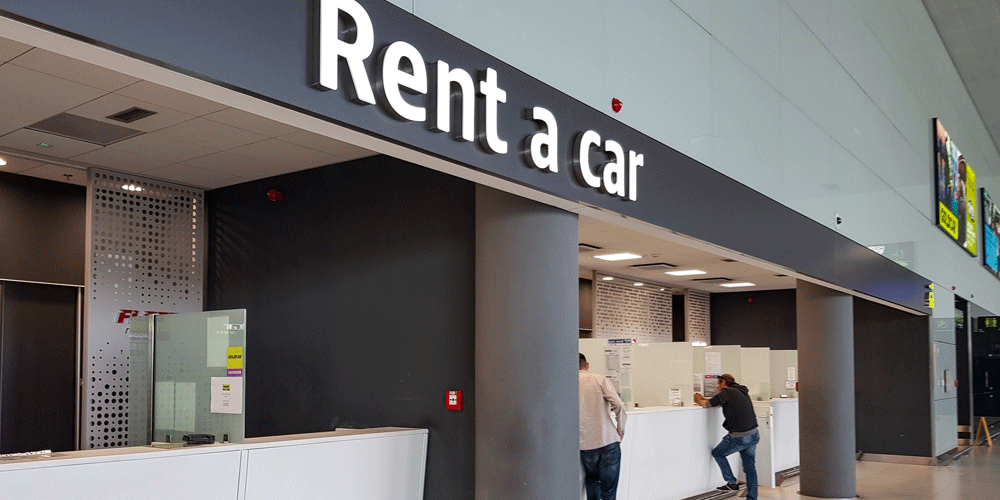Why It’s Important to Communicate With Your Recruiter Before Orientation
Robbie came to ATS with ten years of transportation experience under his belt. He has worked at ATS for the last seven years as a driver consultant. He prides himself on using his industry knowledge to assist drivers in making the best decisions for themselves.
BOO!
Ever heard of ghosting?
Ever ghosted someone?
And no, I’m not talking about your dating life right now.
I’m talking about your relationship with your recruiter. Have you ever committed to an orientation date with a driver recruiter at a trucking company you’ve been longing to work for, only to no-show at orientation? It’s called ghosting and it’s not something you should ever do.
But what should you do when you’ve committed to orientation and you’re no longer interested? Simply move on and ghost the recruiter? Or do you have a difficult conversation and let your recruiter know that you’ve changed your mind?
The wrong move can have a negative impact on you.
Not only is ghosting bad for the carrier, but it can ruin your reputation. It also prevents you from negotiating with the company to get the best job offer.
I’ve been a driver recruiter for a number of years. I deal with truck driver ghosting every single week, and while I certainly don’t enjoy it, my goal is to ultimately help you succeed. And ghosting won’t help you in the long run.
In this blog, you’ll learn:
- The importance of staying in touch with your recruiter after you’ve scheduled orientation
- The three types of truck driver ghosting
- Consequences of ghosting for the company and for you
When you’re finished reading, you’ll understand the importance of staying in touch with your recruiter after you commit to orientation and how to communicate effectively.
Why Do You Need to Stay in Touch with Your Recruiter?
If you’ve already committed to an orientation date, you might be wondering why you need to stay in touch with your recruiter. You’ve both done your job, right? Wrong.
Staying in touch with your recruiter is crucial because your recruiter will still need to collect information from you. Not only will they need to make travel and lodging arrangements and get those details over to you, but they’ll also need you to sign consent forms for background checks and drug screenings.
During this time, you’ll also learn what you need to bring to orientation and what can be expected of you once you get to orientation.
You need to complete all of these steps before you go to orientation. Simply committing to an orientation date isn’t enough; you have follow-up work to do before you get to orientation. If you don’t do this work, you may lose your orientation spot.

Three Types of Ghosting in Truck Driving
There are three types of ghosting that driver recruiters encounter. They’re listed in order of least impactful to most impactful:
- The driver who schedules orientation out a month ahead and doesn’t contact the recruiter again
- The driver who schedules orientation out a month ahead and keeps in contact with the recruiter regularly until a week before orientation
- The driver who keeps in contact the whole time, makes travel arrangements, does the standard check-in the Friday before orientation and then doesn’t show up
In addition to the three types of ghosts, there is also the driver that stops communicating with the recruiter but shows up unexpectedly on the first day of orientation.
I’ll explain how these types of ghosting scenarios play out and affect the driver and trucking company a bit later on.
Ghosting Consequences For the Trucking Company
When you commit to orientation, several other departments (besides the recruiting department) get involved to make sure everything is ready for you. There’s a huge trickle effect when you no-show. The orientation, operations and leasing departments all get involved to get you set up in the system so that you’re primed for success the moment you step into the classroom (virtual or otherwise).
The team prepares and gathers your paperwork and creates your driver file. They set aside a truck for you and get it in the shop before you get here to ensure all maintenance is taken care of for you. This can take hours and hours of time across teams at a trucking company.
More importantly, your recruiter has spent endless hours with you — running background checks, setting up travel arrangements, getting you set up at the company. Ultimately, recruiters are here to help you. And when you take that time and then ghost them, they lose precious time that could’ve gone to a driver that really wanted to be at that company.
Not only do trucking companies lose time, but they also lose a significant amount of money when drivers ghost them. When drivers no-show after travel arrangements have already been made, the company has to eat the cost. More often than not, flights are non-refundable. If the company already paid for fuel and tolls to drive to orientation, they aren’t going to get that money back.
This loss of time and money on the company’s end can in turn play a major role in how the driver is viewed and prioritized if they decide to apply for the company again months down the road.
Ghosting Consequences For You
When you stop communicating with your recruiter, first and foremost you lose your spot in orientation as well as the truck that was set aside for you.
Let’s say you commit to attending orientation one month ahead of time. Your recruiter will reach out to you in intervals to not only keep the line of communication going strong, but to set up travel plans.
They will confirm that you’ve given your two weeks’ notice at your carrier and that you have a plan to turn the truck in. Then they’ll set up transportation for you to get to orientation — whether that’s by rental car, bus or plane. They’ll also need to go through different protocols with you, from collecting information to reviewing new work verifications.
If you stop communicating back and forth with them at any point during this timeframe, they’ll give you a warning that you may be taken off their orientation list. If you continue not responding, they’ll give your orientation spot and truck to someone else.
You could also have your spot given away for failure to comply with company protocol by not providing the information the company needs.
If you decide to start communicating again, you’ll have already lost your spot. You’ll have to reschedule, and depending on truck availability, you may be waiting weeks or months. And that’s only if you haven’t ruined your reputation with that company.
Drivers who don’t show up to orientation or ghost the recruiter put a sour taste in the recruiter’s month, and it can take some convincing to be allowed to come back and attend orientation. Companies will ban drivers if they’ve no-showed and rescheduled too many times.
If this was a company you really wanted to go to, you may have lost your chance — no matter your reason for ghosting.
Ghosting isn’t new. It’s something that trucking companies deal with regularly. And because this happens so frequently, countless policies have been put in place to try to protect the company.
Ghosting isn’t just annoying for the carrier, it’s costly — especially for carriers that foot the bill for accommodations and travel to orientation. To prevent losing so much money from drivers that no-show, some carriers won’t pay for travel. They’ll put you on a bus instead of booking you a flight or a rental car and you won’t be reimbursed for tolls and fuel until you arrive at orientation.
Drivers that no-show have inadvertently created a system that is harder to navigate through because companies are being burned and they’re trying to protect themselves from the heat.
Is It Ever Okay to Ghost Your Recruiter?
No. The answer is no.
If you had an office job, would you ever not show up for your first day? No? Then you shouldn’t do it to trucking companies, either.
It can be uncomfortable to call your recruiter and explain to them that you accepted another offer; it’s never easy to reject someone’s job offer. Maybe you just don’t feel like you have time, or you don’t want to explain to your recruiter why you aren’t going to be at orientation.
The bottom line: We’re all adults here. Short of dying or being critically ill in the hospital, you owe it to your recruiter to let them know when you’re not going to show up to orientation.
Maybe a family member is sick or there’s a family emergency and you’re busy. We get it; things come up. A simple text is enough to let us know you won’t make it. You don’t have to send a lengthy email or make a drawn-out phone call. A text is a common courtesy and it’s the least you can do. It’ll help you maintain your reputation with that company.
How to Effectively Communicate With Your Recruiter
Now, let’s say you’ve committed to orientation but then you decide to go with another company instead. Again, we get it; most drivers are talking to multiple carriers at once. Be honest with us and let us know this when you’re talking to us from the start.
Once again, common courtesy comes into play. If you don’t want an awkward phone conversation, a simple email that thanks the recruiter for their time and explains that you’ve gone in another direction is sufficient.
However, if you really want to stand out to a recruiter, you can give them a phone call and explain to them why you chose a different carrier.
Is the other carrier paying more? Is their home time policy better? Do you want a newer truck than what they can offer? Tell your recruiter. Chances are, they can negotiate with you.
After all, we’re experiencing a driver shortage. If you’re qualified to work with that company, they’ll most likely be willing to negotiate with you.
Maybe they can increase your pay or find you a regional route with more home time. Maybe they can talk to you about their flatbed program, where you’ll make more money than driving vans.
This not only benefits you because you’ll get what you need out of your job, but you also won’t need to fill out another application and go through the qualification process at another carrier.
But if you’d really rather go with another carrier, a phone call will go a long way. And it’ll help the recruiter learn what drivers like you desire out of their programs so they can make helpful changes.
Prepare for Orientation and Truck Selection
I’ve heard every excuse in the book. During my first weekend on-call as a recruiter, a handful of drivers called me and told me that their mother had passed. Only one of those drivers ever rescheduled their orientation date, so it’s safe to say that the rest of them likely weren’t being entirely honest.
But, they did let me know that they wouldn’t be at orientation. And that’s better than no-showing.
By now, you understand that ghosting your recruiter has the potential to ruin your reputation and your chances at a trucking company of your choice. It’s not worth it. A brief phone call or a short email or text is sufficient and will keep you in good standing with the company (unless you’ve done it several times).
Perhaps not knowing what to expect from orientation has made you a little nervous and prone to no-showing. Understanding what can be expected of you at orientation and the truck selection process can help you feel confident from the moment you step into the front door until the moment you drive off the lot in your new truck.



